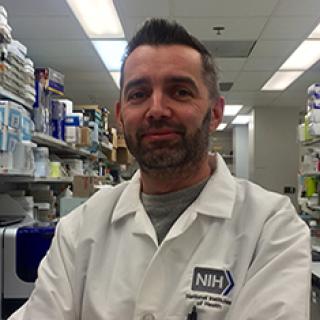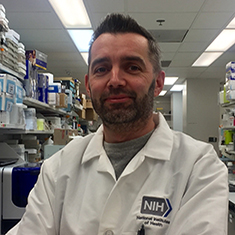
Christophe Cataisson, Ph.D.
- Center for Cancer Research
- National Cancer Institute
- Building 37, Room 4060
- Bethesda, MD 20892
- 240-760-6793
- cataissc@mail.nih.gov
RESEARCH SUMMARY
Dr. Cataisson’s research expertise is centered on skin carcinogenesis (cutaneous squamous cell carcinoma) following two-stage chemical carcinogenesis (DMBA-TPA). He also uses primary mouse keratinocytes to define phenotypic changes caused by oncogenic RAS. He uses genetically modified mouse models to study pathways contributing to carcinogenesis (PKC, MyD88, CXCR2, EGFR, MET, MTOR). Using an in vivo grafting model on a syngeneic host has allowed Dr. Cataisson to probe the respective contribution of cancer cells and their stroma to tumor formation.
Dr. Cataisson’s integrated research takes advantage of using primary cells transformed by a single hit (oncogenic RAS) and exploring their phenotype in vivo in a relevant context.
Areas of Expertise

Christophe Cataisson, Ph.D.
Research
Dr. Cataisson's research expertise is centered on two interrelated areas. He uses mouse models to define pathways contributing to skin inflammation with special emphasis on the chemokine family binding CXCR2. In other studies, he is investigating the role of inflammation in the tumor microenvironment using epidermal squamous carcinoma as a model.
Publications
MET signaling in keratinocytes activates EGFR and initiates squamous carcinogenesis
IL-1R-MyD88 signaling in keratinocyte transformation and carcinogenesis
Inducible cutaneous inflammation reveals a protumorigenic role for keratinocyte CXCR2 in skin carcinogenesis
CXCR2 ligands and G-CSF mediate PKCalpha-induced intraepidermal inflammation
Biography

Christophe Cataisson, Ph.D.
Dr. Christophe Cataisson received an M.S. diploma in cellular biology and physiology from the University Blaise Pascal, Clermont-Ferrand, France, in 1995. He then moved to the University of Jussieu, Paris, France, where he received his Ph.D. in December 2000 for his work on the regulation and function of the Parathyroid Hormone related Peptide (PTHrP) gene in human mammary cancer cells. In 2001, he joined the laboratory of Dr. Stuart Yuspa as a visiting fellow to work on the role of inflammation on skin carcinogenesis and was promoted staff scientist in 2008. Dr. Cataisson joined the research group of Dr. Luo in 2022.
